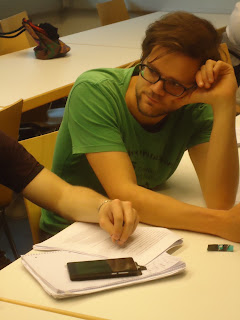Istanbul attacks
My heart goes out to the victims of the Ataturk Airport attacks. This is unscientific, but I saw and heard way too much speculation and guesswork by "experts" in the immediate aftermath of the attack. Guesswork is not news.
Orlando shootings reveal familiar media habits
Some thoughts on media coverage of the Orlando nightclub shooting:
1. Typical of traditional media coverage of mass shootings, reporting about Orlando was too heavily focused on the shooter, rather than the victims. A simple Google News search (June 20, 2016) using the names of four randomly selected victims showed 2,140, 4,770, 27,500, and 75,800 hits--an average of 27,552 hits per victim. The same search on the same day using the shooter's name scored 1,440,000 hits--52 times more hits than for the average victim. (from Peace Journalism Principles and Practices, to be published by Routledge/Taylor and Francis in September, 2016).
News executives, of course, are aware of the dilemma when it comes to publicizing the shooter. Kim Murphy, assistant managing editor at the Los Angeles Times, said about the Orlando coverage, “The news value of this guy outweighed any ultimately artificial desire to put him under a rug somewhere. It’s almost a societal necessity to know: Where did we as a culture screw up?” (Columbia Journalism Review, June 14, 2016)
I still prefer the model proposed by “No Notoriety,” a website and movement spearheaded by the families of mass shooting victims. They propose, as the name suggests, less coverage of the shooter and his rantings. (https://nonotoriety.com/)
2. A flood of inaccuracy usually accompanies breaking news coverage of mass shootings. Recognizing this, NPR took the interesting step of posting on its website a revealing graf—what I call a “preemptive mea culpa:”
This is a developing story. Some things that get reported by the media will later turn out to be wrong. We will focus on reports from police officials and other authorities, credible news outlets and reporters who are at the scene. We will update as the situation develops. (https://www.washingtonian.com/2016/06/13/nprs-orlando-coverage-came-warning-label/)
I guess I’m old fashioned, but here’s an idea—save the mea culpas, and don’t publish speculation or any other information that isn’t verified accurate.
My heart goes out to the victims of the Ataturk Airport attacks. This is unscientific, but I saw and heard way too much speculation and guesswork by "experts" in the immediate aftermath of the attack. Guesswork is not news.
Orlando shootings reveal familiar media habits
Some thoughts on media coverage of the Orlando nightclub shooting:
1. Typical of traditional media coverage of mass shootings, reporting about Orlando was too heavily focused on the shooter, rather than the victims. A simple Google News search (June 20, 2016) using the names of four randomly selected victims showed 2,140, 4,770, 27,500, and 75,800 hits--an average of 27,552 hits per victim. The same search on the same day using the shooter's name scored 1,440,000 hits--52 times more hits than for the average victim. (from Peace Journalism Principles and Practices, to be published by Routledge/Taylor and Francis in September, 2016).
News executives, of course, are aware of the dilemma when it comes to publicizing the shooter. Kim Murphy, assistant managing editor at the Los Angeles Times, said about the Orlando coverage, “The news value of this guy outweighed any ultimately artificial desire to put him under a rug somewhere. It’s almost a societal necessity to know: Where did we as a culture screw up?” (Columbia Journalism Review, June 14, 2016)
I still prefer the model proposed by “No Notoriety,” a website and movement spearheaded by the families of mass shooting victims. They propose, as the name suggests, less coverage of the shooter and his rantings. (https://nonotoriety.com/)
2. A flood of inaccuracy usually accompanies breaking news coverage of mass shootings. Recognizing this, NPR took the interesting step of posting on its website a revealing graf—what I call a “preemptive mea culpa:”
This is a developing story. Some things that get reported by the media will later turn out to be wrong. We will focus on reports from police officials and other authorities, credible news outlets and reporters who are at the scene. We will update as the situation develops. (https://www.washingtonian.com/2016/06/13/nprs-orlando-coverage-came-warning-label/)
I guess I’m old fashioned, but here’s an idea—save the mea culpas, and don’t publish speculation or any other information that isn’t verified accurate.






